|
|
|
Sort Order |
|
|
|
Items / Page
|
|
|
|
|
|
|
| Srl | Item |
| 1 |
ID:
137152


|
|
|
|
|
| Summary/Abstract |
Within the debate on climate change and human rights, the field of culture, or cultural heritage in particular, plays a marginal role. At first glance, this seems reasonable, given the range of more concrete challenges people face in the context of climate change. However, the protection of cultural heritage is an important goal in its own right, even against the backdrop of other seemingly more pressing tasks. A human-rights-based approach to the debate on cultural heritage and climate change, it is argued, reinforces the international community's obligations to take necessary mitigation activities. Cultural rights and the corresponding duties, especially those under Article 15(1)(a) of the International Covenant on Economic, Social and Cultural Rights, have the potential to provide an effective additional normative basis for the protection of cultural heritage from the adverse consequences of climate change.
|
|
|
|
|
|
|
|
|
|
|
|
|
|
|
|
| 2 |
ID:
137155
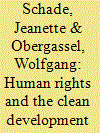

|
|
|
|
|
| Summary/Abstract |
The 2010 UN climate conference in Cancún emphasized that ‘Parties should, in all climate change related actions, fully respect human rights’. However, so far there is no further guidance. This article discusses the relevant legal human rights norms and two case studies from the Kyoto Protocol's Clean Development Mechanism (CDM). The first case (Bajo Aguán, Honduras) shows that the current absence of any international safeguards can lead to registration of highly problematic projects. The second case (Olkaria, Kenya) suggests that safeguards, introduced here as a side effect of World Bank involvement, can have a positive impact, but that it is necessary to have them based on human rights. It therefore seems recommendable that the UN climate regime develop mandatory human rights safeguards. In addition or alternatively, individual buyer countries or groups of countries, such as the European Union, could introduce their own additional requirements for CDM projects
|
|
|
|
|
|
|
|
|
|
|
|
|
|
|
|
| 3 |
ID:
137149
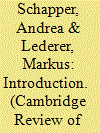

|
|
|
|
|
| Summary/Abstract |
This special issue contributes empirical analyses to the evolving research programme on human rights and climate change within international relations (IR) scholarship. We aim to supplement the existing normative debate within political philosophy and political theory on international, environmental and intergenerational justice (for example, Hiskes 2009; 2010; Woods 2010; Shue 2011; Arnold 2011) with empirical insights that regard human rights as a yardstick for climate-relevant action. We pay particular attention to institutionalization processes at the intersection of human rights and climate change.
|
|
|
|
|
|
|
|
|
|
|
|
|
|
|
|
| 4 |
ID:
137156
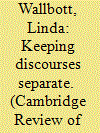

|
|
|
|
|
| Summary/Abstract |
The Alliance of Small Island States (AOSIS) encompasses more than 40 low-lying and island developing states that are among the most vulnerable but also most vocal parties in international climate negotiations. Over the years AOSIS's strategies comprised of the building of scientific expertise, and leadership by example, but also a particular framing that puts emphasis on multilateral processes to deal with issues of common concern and established principles of the international community. The initial assumption of the paper is that a frame alignment of climate change and human rights concerns would strengthen the coalition's moral and legal arguments. However, as a frame analysis of close to 50 coalition submissions and statements reveals, such a linkage is not established. The paper concludes by outlining three possible explanatory factors for this observation: the nature of the issue area, the character of the coalition and the professional background of AOSIS negotiators.
|
|
|
|
|
|
|
|
|
|
|
|
|
|
|
|
| 5 |
ID:
137148


|
|
|
|
|
| Summary/Abstract |
Since its institutional birth in 1947, the General Agreement on Tariffs and Trade (GATT) / World Trade Organization (WTO) has mushroomed from 23 original contracting parties to 157 members as of September 2012. Another 28 countries are currently observers, each at varying stages of the accession process. WTO members and observers cover some 99 per cent of the world's population and over 99 per cent of global trade. However, there are still 13 states outside the multilateral rules-based trading system. This paper argues that existing explanations of membership and accession do not fully explain why these states remain outside the WTO, with implications for membership in international institutions generally. The paper tests hypotheses of non-membership based on a lack of willingness (domestic support), ability (technical capacity) or external pressure, and augments these statistical findings with a comparative country-level narrative of WTO (non-)accession decision-making in two small island countries.
|
|
|
|
|
|
|
|
|
|
|
|
|
|
|
|
| 6 |
ID:
137145
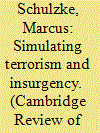

|
|
|
|
|
| Summary/Abstract |
This article analyses several video games created by Hezbollah and Afkar Media which simulate recent conflicts in Israel and Lebanon. These games are representative of an important new means of waging ideological warfare which is increasingly a part of the media strategies that states, violent non-state actors and media corporations employ in their efforts to persuade audiences. I argue that video games allow their developers to address players as though they were participants in ongoing conflicts, rather than passive observers, and that this style of presentation is extremely useful to efforts to create an attractive image of people who are frequently described as ‘terrorists’. Video games also enable their developers to carefully construct media narratives that appear to be realistic depictions of contemporary conflicts even when those narratives show signs of bias. Through these mechanisms, video games provide violent non-state actors and organizations sympathetic to them with a means of presenting their grievances and displaying their fighting prowess in ways that advance the organizations' strategic goals
|
|
|
|
|
|
|
|
|
|
|
|
|
|
|
|
| 7 |
ID:
137150
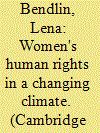

|
|
|
|
|
| Summary/Abstract |
A women's rights perspective can inform and structure research on climate policy impacts on women. To date, climate policy analysis has mostly considered women as agents of climate protection, that is, objects of mitigation policies, rather than subjects in their own right. However, climate change mitigation involves direct and indirect distributive effects depending on which sectors are involved, which instruments are chosen and how funds are obtained and allocated. Since gender roles impact on individual livelihoods and activities, distributive effects are likely to be gendered. This paper suggests that women's human rights can be used as a framework for research aiming to fill this gap. They provide a well-developed, tested range of criteria for gender justice. Such assessments would allow for a more systematic and comprehensive understanding of the gendered distributive effects of climate policies, notably with regard to the particularly understudied situation in the industrialized world.
|
|
|
|
|
|
|
|
|
|
|
|
|
|
|
|
|
|
|
|
|